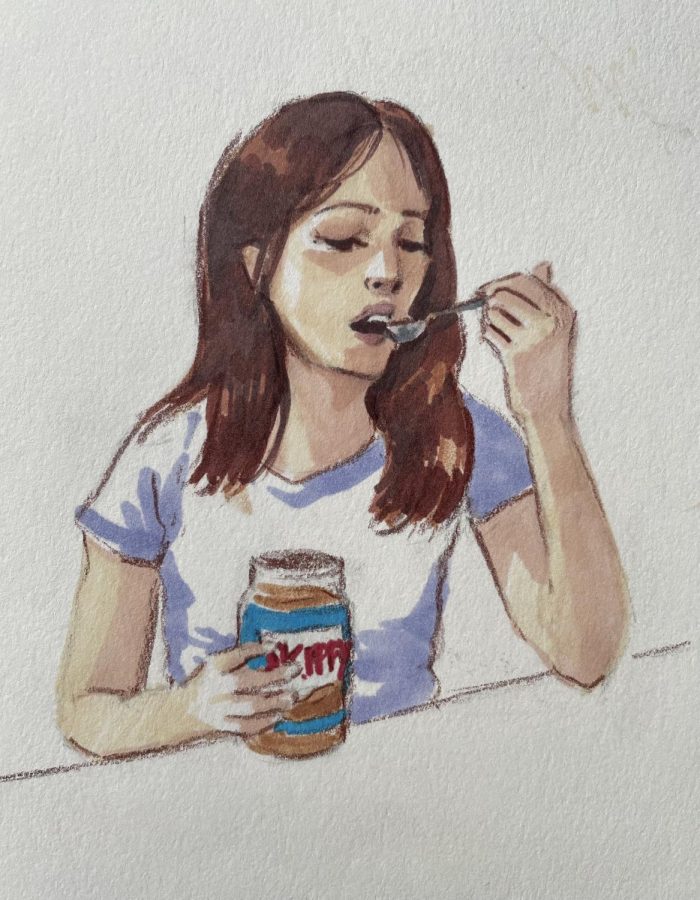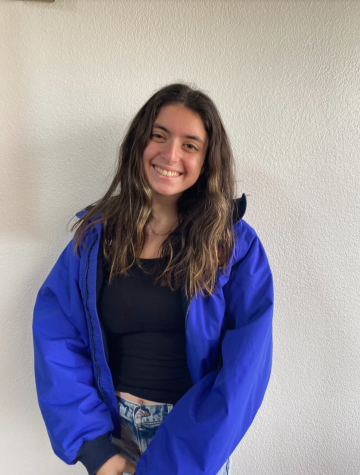From anaphylactic to adaption, OIT saves lives
Teenager being exposed to allergy during OIT(Oral Immunotherapy) treatment session. The treatments help patients with allergies build their tolerance to their allergen by increasing their dosage of food each session.
May 27, 2022
Every Tuesday, I wake up at 5:45 am, leave my house at 6:15 am and drive 27 miles north for exactly one teaspoon of peanut butter. The peanut butter has to be room temperature, “smooth” and the brand SKIPPY, precisely. And, these aren’t my guidelines, they’re the preferences of PalforziaTM
For most people, this probably seems pretty peculiar, but for me, and 15,000 others, it’s life changing. For the past five months, I have been enrolled in Oral Immunotherapy(OIT), which is a system that helps desensitize anaphylactic patients by gradually increasing the dosage of their food allergen, building resistance and tolerance, with the goal of outgrowing the allergy as a whole.
Anaphylactic reactions differ depending on the severity of the allergy as well as the concentration ingested. Anaphylactic shock occurs when blood pressure drops significantly and the airways narrow, ultimately restricting the ability to breathe. However, the progression isn’t always sequential and could worsen within seconds. One reaction could result in eye swelling while the next results in anaphylaxis.
The Epinephrine Auto Injector(Epipen) is an emergency device used during a severe reaction that injects epinephrine, or adrenaline, into the system, attempting to open the airway and overtake the reaction. However, if not used in time, and the brain is deprived of oxygen, the results can be severe, or fatal.
OIT was first introduced in 1908 when AT Schofield successfully desensitized an anaphylactic child to eggs by gradually increasing the quantity administered. On the first day, Schofield gave the patient 1/10,000 of an egg, “the starting dose”, and five months later, he was able to freely consume eggs with no reaction.
One century later, OIT has grown tremendously in popularity and become a savior for people all around the world. With around 32 million Americans currently diagnosed with food allergies, OIT reduces the risk of harm tremendously. While OIT is still not widespread, with only about 200 allergists offering this program nationally, and success in a program is not guaranteed, nearly 80% of patients, specifically with peanut, milk and egg allergies, will outgrow their allergy completely after leaving an OIT program. Depending on reactions and duration between appointments, this process typically takes five to six months.
Lauren Whalen, physician assistant at the Allergy and Asthma Care of Rockland County, has worked directly with allergies and immunology for the past five years where she has grown really passionate about OIT. She mentioned that seeing the way food allergies disrupt so many of her patients’ lives is “heartbreaking”.
She said, “Prior to OIT, so many children feel so isolated–not being able to go to sleepaway camp, sit at the ‘normal’ lunch table in school or even go to birthday parties–so trying to help make a difference for them and their families has been a huge motivator for me.”
Isaac Keiser, a rising junior at the Washington University in St. Louis, was born with severe allergies to eggs, peanuts, tree nuts and dairy. In fourth grade, he was enrolled in an experimental trial of OIT at the Children’s Hospital of Philadelphia to desensitize him to eggs.
In this trial, Keiser was first exposed to foods with baked eggs, like meringue cookies, and gradually was exposed to foods cooked less, like french toast, which would help build tolerance and resistance. Eight months later, Keiser had outgrown the allergy, being the first person across the globe to receive this treatment.
He said, “I know it gives my family and myself a lot of peace of mind knowing I won’t accidentally eat something with eggs in it and might need to go to the hospital.”
OIT isn’t always linear; sometimes when patients struggle, the reason as to why they are experiencing a reaction isn’t clear. And Whalen reflected how observing a patient not get the results they wanted is challenging to watch. However, when a patient reaches a point of ‘normalcy’ in their life, it is incredibly gratifying.
Whalen said, “Months later, seeing one of my patients come back after graduating and just hearing how much their life has changed is the most rewarding part of all of this.”
Years later, as a college student, Keisner reflected on the way that OIT has given him this sense of safety and comfort in his everyday life.
He said, “I cannot stress how much OIT has impacted my life. The biggest thing I gained from it was freedom.”




